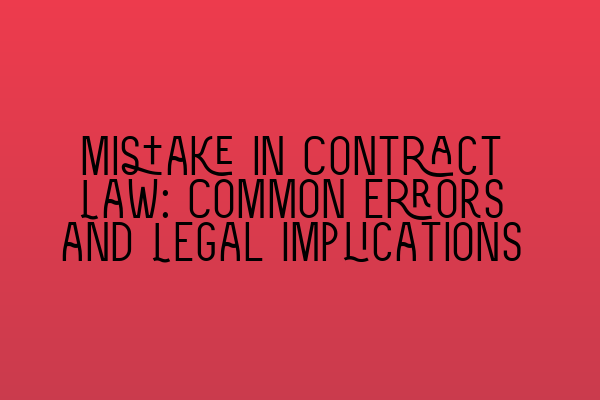Mistake in Contract Law: Common Errors and Legal Implications
Contract law is an intricate field that requires a deep understanding of its principles and provisions. However, even with meticulous attention to detail, mistakes can still occur in the formation of contracts. These mistakes can have significant legal implications, and it is crucial for both solicitors and individuals involved in contractual agreements to be aware of them. In this blog post, we will explore some common errors in contract law and the potential consequences they may entail.
1. Mistakes in the Formation of a Contract
The formation of a contract requires mutual assent, offer, acceptance, and consideration. However, mistakes can arise during this process. These mistakes can be categorized into unilateral mistakes, mutual mistakes, and common mistakes.
Unilateral mistakes occur when one party makes an error in understanding the terms of the contract. In such cases, the mistaken party may seek remedies such as rescission, reformation, or damages. For example, if Party A mistakenly offers to sell their car for $1,000 instead of $10,000, they may request the contract to be reformed to reflect the correct price.
Mutual mistakes, on the other hand, occur when both parties are mistaken about an essential element of the contract. In such cases, the contract may be voidable by either party. For instance, if Party A agrees to sell their car to Party B, mistakenly believing it to be a different make and model, both parties may have the right to rescind the contract.
Common mistakes are errors that occur due to a fundamental misconception shared by both parties. These mistakes can render the contract void ab initio, meaning it is considered invalid from the beginning. An example of a common mistake would be if both parties contracted for the sale of a painting, believing it to be an original work by a famous artist when, in reality, it is a forgery.
2. Mistakes in the Terms of the Contract
Mistakes can also occur regarding the terms of the contract, leading to disputes and potential legal consequences. These mistakes commonly involve errors in drafting or misinterpretations of clauses.
One of the most common mistakes is a typographical error or a clerical mistake in the written contract. These errors can unintentionally alter the terms and obligations of the parties. In such cases, the court will usually assess the intentions of the parties and determine if the mistake was a genuine error or a deliberate attempt to deceive.
Another significant issue is the interpretation of ambiguous contract terms. This occurs when the language used in the contract can reasonably be interpreted in more than one way. Disagreements may arise when the parties disagree on the meaning of a particular clause. In these situations, the court will consider the surrounding circumstances, industry practices, and the intentions of the parties when interpreting the contract.
3. Mistakes in the Execution of the Contract
Mistakes can also occur during the execution or performance of a contract. These mistakes often revolve around issues such as non-compliance with contractual obligations, failure to adhere to agreed-upon timelines, or incorrect delivery of goods or services.
Such mistakes can result in breaches of contract, which can lead to legal actions for damages, specific performance, or termination of the contract. Additionally, if the mistake hinders the fundamental purpose of the contract, it may be deemed frustrated, and the parties may be discharged from their contractual obligations.
4. Legal Implications and Remedies
The legal implications of contract mistakes vary depending on the specific circumstances and the type of mistake involved. In general, the remedies available to the injured party include rescission, reformation, specific performance, or damages. The court will aim to rectify the mistake and restore the parties to their positions before the occurrence of the error, whenever possible.
Rescission allows the aggrieved party to cancel the contract and return to their pre-contractual positions. Reformation permits the court to modify the contract to correct the mistake and reflect the true intentions of the parties. Specific performance compels the breaching party to fulfill their obligations as originally agreed upon. Damages, on the other hand, are a monetary award granted to compensate the injured party for losses suffered due to the mistake.
It is crucial for solicitors and individuals involved in contracts to seek legal advice promptly when a mistake is discovered. Professional guidance will help navigate the complex terrain of contract law and determine the most appropriate course of action.
In conclusion, mistakes in contract law can have significant legal implications. Understanding the different types of mistakes and their consequences is vital for solicitors and individuals alike. By being aware of these common errors, one can proceed with contract negotiations and execution more effectively, reducing the risk of disputes and costly legal battles.
Related Articles:
– SQE 1 Practice Exam Questions
– SQE 1 Practice Mocks FLK1 FLK2
– SQE 2 Preparation Courses
– SQE 1 Preparation Courses
– SRA SQE Exam Dates
